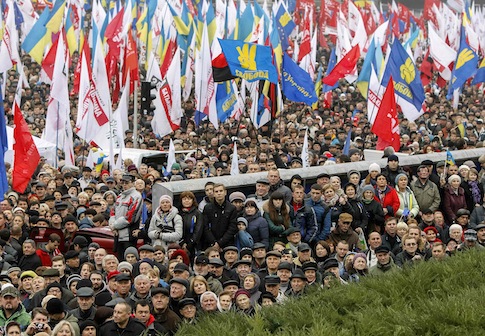By Richard Balmforth
KIEV (Reuters) - Tens of thousands of Ukrainians marched to President Viktor Yanukovich's office on Sunday, denouncing a U-turn away from Europe and towards Russia in the biggest street demonstrations since the Orange Revolution nine years ago.
Riot police and an angry group of demonstrators clashed in front of government headquarters, spraying each other with pepper gas and fighting with batons, days after the surprise decision by Yanukovich's prime minister Mykola Azarov to walk away from a trade pact with the European Union.
As demonstrators chanted "Down with the Gang!", opposition leaders told the crowds through loud-hailers they would start moves to impeach the president unless he signed a major trade pact with the EU on November 29 as originally planned.
The signing of the association agreement was to be the center-piece of an EU summit in the Lithuanian capital, Vilnius, next Friday and mark a historic swing westwards away from Russia, Ukraine's old Soviet master.
The Kremlin had threatened trade retaliation, arousing fears of cut-offs in supplies of Russian gas to Ukraine and through it to the West.
Opposition leaders say Yanukovich had never intended to sign in Vilnius and had used protracted negotiations as a screen while bargaining with Russia to secure a lucrative deal which would also ensure his re-election in 2015.
"They were lying all along," world boxing champion-turned politician Vitaly Klitschko said on a TV talk show on Friday night.
The demonstrators, some of whom carried a huge blue flag by its side and corners that bore the Ukrainian national emblem within the traditional EU ring of yellow stars, marched two kms from Kiev's central Taras Shevchenko park to the city's European Square, half a mile (one km) from Yanukovich's office.
There they set up a tent city as their headquarters and vowed to stay there until at least November 29.
TYMOSHENKO CALL
Jailed opposition leader Yulia Tymoshenko, whose release EU envoys had been trying to negotiate, said the deal was for Ukraine "a roadmap for a normal life, a quantum leap from the deep wilderness of dictatorship to a civilized future."
"We must force them to sign this agreement on November 29 and in Vilnius, otherwise they will never sign," she added, in a message read out to the crowd by her daughter.
"Yanukovich should fly to Vilnius and fulfill the will of the people and sign the agreement," declared former economy minister Arseny Yatsenyuk, another opposition leader.
Far-right nationalist leader Oleh Tyahniboh, whose Svoboda (Freedom) party seeks to reverse Ukraine's deeply-ingrained reliance on Russia, called for Yanukovich's impeachment and the resignation of "Azarov's disgraceful government".
"Today we are giving our answer to Moscow, to (Russian President Vladimir) Putin. Let them see that they cannot build a 'Russian world' here. They are not going to have Ukrainian leaders in their pockets and under their control," he said.
The huge turnout - many observers put the figure at around 100,000 demonstrators - made it the biggest protest rally in Kiev since the Orange Revolution of 2004-5. Thousands also turned out in other major cities such as Lviv and Kharkiv.
The 2004 protests, co-led by Tymoshenko, caused the collapse of the old post-Soviet order and doomed Yanukovich's first bid for the presidency.
She went on to become prime minister but five years of chaotic rule with erstwhile Orange ally, President Viktor Yushchenko, allowed Yanukovich to make a comeback in 2010.
Tymoshenko was jailed the following year for abuse of power after a trial which Western governments say was political.
Azarov says the policy reverse after years of building up to a signing in Vilnius had been driven by the critical state of the economy and a lack of support from the International Monetary Fund.
The country of 46 million is heavily indebted and must find more than $17 billion next year to meet gas bills to Russia and debt repayments including $3.7 billion to the IMF.
Azarov's government has put out feelers to the Fund over a possible new bail-out.
But it has been told Ukraine must raise domestic gas prices and allow the national currency, the hryvnia, to float more freely against the dollar - something which the leadership refuses to do because it will have an impact on Yanukovich's re-election chances in 2015.
(Additional reporting by Serhiy Karazy, Gleb Garanich, Natalya Zinets and Pavel Polityuk; editing by Patrick Graham)
